By Jeffrey A. Rendall; Photos By Jeff Janas
WILLIAMSBURG, VA Ė The 2004 PGA Tour seasonís first event was the Mercedes Championship (at Kapalua, Hawaii) in early January, followed by the Sony Open, also in Hawaii. Since then, the Tourís moved to the California desert, over to Phoenix, back to California for the AT & T (at Pebble Beach), and finally down to San Diego for the Buick Invitational.
Already in Ď04, weíve witnessed the continued outstanding performances of Vijay Singh (his San Diego performance notwithstanding), a resurgent Phil Mickelson, a potential rising star in Jonathan Kaye and the pleasing though controversial play of 14 year-old Michelle Wie, who teed it up in the Sony Open and barely missed the cut (though she was under par in doing so). And how about John Daly? Wow.
In other words, the seasonís well underway Ė and thereís little need for a Ďpreview.í But several issues have already surfaced in this young season, and who better than former Ryder Cup Captain and current ABC Golf Analyst Curtis Strange to address them? Strange is well regarded for his playing career, of course, and heís given much credit for his straight and to the point broadcasting style. He tells it like it is, and itís clear he has a lot on his mind these days, with golfís youth movement, his impending decision on whether to join the Champions Tour when he turns fifty next January, and also the coming Ryder Cup in September.
I visited with him after the FBR Phoenix Open, and heís given us much to think about as we look forward to the balance of the 2004 PGA golf season:
GTMA: Before we talk about the í04 season, letís hear about your playing plans for the year.
Strange: Iím not playing a lot these days. Iíll probably play what I did last year, six or seven events, maybe eight.
Iím going through the thought process of what Iím going to do next year, when I turn fifty, and there are a few different options. One is to completely do TV and play only a few senior events. Another is to try and split time both ways, which I will not do Ė if you split things up half and half, you canít do either one well. Yet another is to just play, and I donít know if I want to do that.
Thereís a reason why I didnít like my game when I backed off from playing a lot Ė and certainly if Iím not working at it, itís not going to improve.
GTMA: Has the resurgence of the over forty players in recent times altered your thinking any?
Strange: No. Iím happy for Ďem, donít get me wrong Ė but it doesnít make me want to go out there and practice. Iím not going to fool myself Ė I quickly remember why I went to the TV booth. I also play enough now to know how Iím doing, to remind myself how hard this game really is.
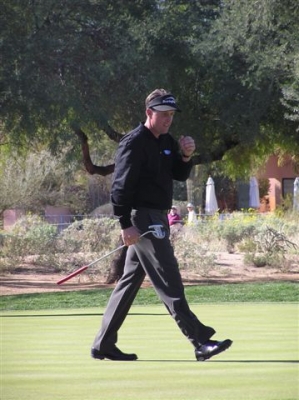 |
| There's little doubt -- with 4 top 10's in four 2004 starts, Phil Mickelson's walking with that swagger again, to the delight of fans everywhere. |
And you have to put in a complete effort to play well.
You look at guys like Jay Haas, Peter Jacobsen, Craig Stadler, Steve Lowery, Loren Roberts, a lot of guys in their mid to late forties playing really well. But theyíve stayed right in the middle of the game and continue to work at it.
The main thing is theyíve kept incredible enthusiasm through their forties.
GTMA: Indeed they have. Speaking of enthusiasm, I particularly enjoyed the Phoenix tournament, because of the Ďcrowd participationí out there. You got into it a bit with Mike Tirico about that Ė what are your thoughts on crowd behavior on Tour?
Strange: Oh, crowd behavior is generally pretty good, when you think about putting that many people on a golf course, week after week. Forget about Phoenix Ė thatís the biggest crowd they have in golf around the world.
You have a vocal couple of Ďfans,í and that always ruins it for a lot, but that happens. It happened 20 years ago, too, so thatís nothing new. I think the Tour is doing a pretty good job disciplining those few who step out of bounds.
Then you have Phoenix.
GTMA: Is that bad?
Strange: Phoenix is great for a fan out there, or somebody snowbound up in DC or New York, because itís a lot of fun to watch. Thatís why ABC gives it a lot of airtime Ė itís a lot of fun, and itís different.
For my credibility, as an announcer/player, I have to say what the players are thinking. From a playerís perspective, Phoenix is very disconcerting, very tough. Iím not saying itís wrong Ė because when youíre on that hole (the 16th, a par three), theyíre pretty good.
Itís the hole before and after, and around the golf course that the noise gets to you.
Thereís an argument Ė and itís a good argument Ė that the same thing happens at places like Augusta, with the roars amongst the pine trees.
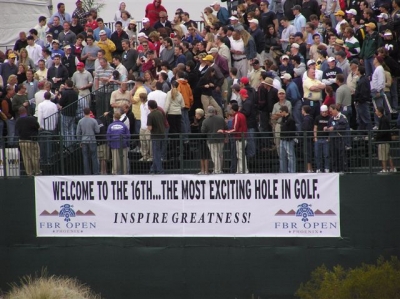 |
| They're not shy out in Phoenix -- the 16th hole may be the most exciting, but it's also the most controversial. |
GTMA: Yes, but at Augusta, theyíre not chanting A-S-U amongst those pine trees.
Strange: True. But talking about it with Mike Ė heís never walked out on that tee as a player. I completely disagree with him, and thatís why I think it made for good TV, because we both presented our different thoughts on it.
What Iím talking about is the par five before that hole. If youíre in that fairway, youíve got a two-iron over water to a small green, then you have to listen to them chanting and singing things like ĎYouíve lost that loving feelingí to Judy Rankin.
One of the drunks went down to propose to Judy, and 500 people started singing that. Well, it was funny. From my point-of-view it was funny, because Iím not playing. But damn if I want to be firing a two-iron over water while listening to that (laughs).
Itís okay once a year, I guess.
GTMA: Another thing that we were originally supposed to see once a year is causing the most buzz around professional golf Ė speaking specifically of Michelle Wie and her performance at the Sony Open. Care to weigh in on women playing on the menís professional Tour?
Strange: God, I usually try to stay away from this one.
First, let me say what Annika Sorenstam did last year at The Colonial was fantastic. She was, by far and away, the best female player in the world, and she wanted to play against the men to see how good she was. I think thatís fine, and I think it was terrific the way she handled herself, and how she played.
What Annika did was not a PR move, and I can respect that.
When we get into some of these others, youíre moving a lot closer to what I would say are PR moves, and Iím not a fan of that.
GTMA: Wie played really well. Does that make a difference?
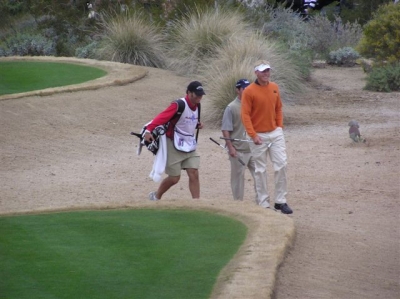 |
| Ricky Barnes is one of the exciting young players to watch in '04, though he'll have to take advantage of his sponsors exemptions to keep playing on the PGA Tour. |
Strange: Iím concerned about her for one reason Ė sheís fourteen years old. Iím concerned that sheís too young for the atmosphere, the cutthroat competition on the menís tour, especially.
Iím not one of these guys who believes sheís Ďmissing out on her life,í because, as Ty Tryon found out recently Ė these guys and girls, golf is what they enjoy doing. Like me, I grew up on the golf course.
So theyíre not missing a damn thing Ė theyíre doing exactly what they want to do, and theyíre having fun. So I donít buy that argument.
GTMA: So whereís the problem?
Strange: I donít know. Sheís extraordinary, phenomenal at her age. What she did at the Sony, I think surpassed what Annika did, just a little bit. And thatís because sheís only fourteen.
Iíd like to see her play at her level and learn how to win. Iím not talking about the junior level Ė her level is probably all the womenís big amateur events, and maybe even menís amateur events. I donít know if she can even play in those.
I think itís a little early for her on the PGA Tour.
Now, she can play on the LPGA Tour if she wants, but in my mind, she doesnít accomplish anything by trying to succeed at a level where she hasnít gone through the steps to know how to play with that type of competition.
GTMA: Sheís said sheís going to defend her US Womenís Public Links title down there in your neck of the woods, at the Golden Horseshoe in Williamsburg. She passed up a sponsorís exemption to the Booz-Allen Classic (formerly known as the Kemper Open) to do that.
Strange: Which she should, and thatís the smart thing to do, the proper thing for her to do. If she starts not defending big events like that Ė the US Womenís Public Links Ė only to play in a menís PGA event, now youíre looking at PR moves versus whatís the proper thing to do.
GTMA: Sheís already been offered exemptions to at least seven PGA Tour events this year.
Strange: Has she actually? Well, thatís a PR move. Thatís where we get into the argument of what a sponsor is supposed to do with its exemptions.
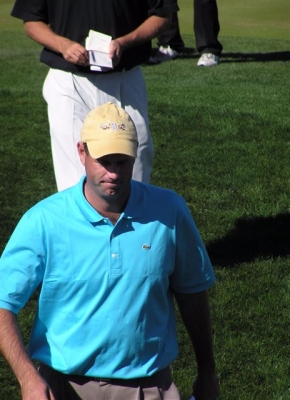 |
| Stewart Cink used steady though quiet play to win a spot on the '02 American Ryder Cup Team. He'll need to do so again this year if he hopes to make the squad. |
If you were a tournament director, and you had a choice of offering an exemption to Michelle Wie or Ricky Barnes (2002 US Amateur Champion, who played well in last yearís Masters Tournament), who would you give it to?
Do you go with Wie and the short-term PR boost, or with the long-term investment in Barnes and hope, if he hits it big, that he remembers that you gave him a spot and he comes back?
A lot of these tournaments are hurting, and seriously need to consider that publicity boost right away, since not every event gets the big names like Tiger Woods.
GTMA: Greg Norman spoke out on the issue Ė heís against granting exemptions to female players, and thinks it should be written into the Tour rules. More and more players seem to be getting in on it.
Strange: Oh boy. See, this is where it goes to. You canít hardly blame the sponsor for granting these exemptions, because heís trying to bring attention to the event. At the same time, you canít really bring it to an embarrassing level, like the Kemper Open did with Mark Rypien that time.
Thatís just a tough, tough issue.
GTMA: Another tough one that everyone seems to be wrestling with, but no one seems to know how to solve, is the equipment issue Ė how to deal with technological advances that may be changing the nature of the game.
Strange: Thereíre new things out on the market right now, but nothing thatís going to change a lot from last year. Drivers are as close to the maximum as they can get. Irons are just getting better and more consistent; putters, the same thing.
If there is a problem, the argument goes that testing hasnít kept up with the technology. So now, weíre trying to get everyone together Ė the Tour, manufacturers, the USGA, everyone Ė to get the exact same testing for drivers and golf balls.
GTMA: Are you for that?
Strange: Oh yeah. We have to have testing, absolutely. I just found out last week that thereíve been quite a few guys whoíve had their drivers tested already, and itís not mandatory.
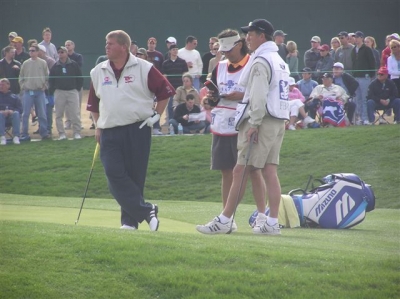 |
| John Daly's back. His win in the Buick Invitational has to rank as one of the most popular in recent times. Not bad for a guy who hasn't won on American soil in nearly ten years. |
I heard seven were called illegal. But what does that mean?
If my driverís illegal, it means the ballís going another one or two yards farther Ė itís not thirty yards, like some people think.
GTMA: Tigerís been very vocal on the issue, as have many others.
Strange: We all know who heís talking about. Not so much the person, but we know the company. That companyís had a couple more than their share of illegal drivers on Tour.
GTMA: Any hints?
Strange: Itís not Titleist. Thatís the farthest Iíll go.
But again, if the driverís illegal, youíre talking a couple yards. So itís the combination of a certain ball, driver and shaft thatís creating the increased distance Ė because some of these guys are hitting it a long ways, a lot farther than they used to.
But overall, I donít worry about stuff like that, and itís never bothered me too much. If guys are crossing the line, we should test Ė and thatís the next step for us to do that.
GTMA: As far as the season goes Ė the past couple seasons, weíve had Ďthemesí such as first-time winners or the return of the veteran players. Do you see any major Ďthemesí heading into this season?
Strange: When I think about this year Ė everybodyís anxious to see what Tiger does, thatís a given, since it looks like Ernie Els has gotten better, and I think Vijay is relentless. Heís just phenomenal with his work ethic, and the way he plays and doesnít give up or get upset. He just plods along, and at the end, it seems heís always up there.
Then youíve got Davis (Love III), Phil (Mickelson) and a handful of guys that itís going to be interesting to see if they can make a run at Tiger for the worldís #1 spot. Thereís some light at the end of the tunnel with Vijay winning the money title last year. Thatís given some inspiration to the best players Ė they now know Tigerís beatable.
GTMA: Thatís true, Vijay Singh beat him in one of the most important categories, capturing the money title. I argued that Singh shouldíve won Player of the Year last year because of it, and also because he was more consistent all year long. You said Tiger deserved it, despite the fact heíd won it so many years in a row. What was your thought process on that?
 |
| Funny how many commentators neglect to mention Sergio Garcia when talking about the game's best players. At 24, he seems like he's been around forever -- and when he puts it all together, he's definitely one of golf's most exciting players. |
Strange: First of all, how ever many years in a row heís won it, that shouldnít be a factor. Iíve said on air that I think some players are looking for a reason not to vote for Tiger. Itís nothing personal, but whenever someone wins an award like that for a long period of time, people want to see someone else get it.
My deciding factors were: Tiger won five events, Vijay four, and Tigerís events were more prestigious with better fields. Tiger played in a lot fewer events to get those wins. And, something that I put a lot of weight on Ė Tigerís scoring average was about a half shot per round better than Vijayís. Thatís huge.
Vijay had a wonderful year, and Iím glad he won the money title. I think itís good for golf and the Tour and good for the locker room chatter to have a serious debate on who deserved it more.
So many people have said Tiger had a bad year by his standards, so why would he be player of the year?
Well, because heís still the best player.
GTMA: You probably wonít get many arguments that Tigerís still the best player, and still deserves the #1 ranking, but you have to admit 2003 wasnít a great year for him. He did win those tournaments, but he was a virtual no-show in three of the four majors.
Strange: He just didnít play well on those occasions.
When Iíve been doing his events, and I tell him Ė he drives it all over the lot. Heís just so good that he can still win from there, but heís just got to get back to swinging the way he swung a couple years ago.
Heís not working with Butch (Harmon) anymore, and itís easy for me to say, but I think thatís a mistake. I know Tiger knows his own swing, but then again I think heís working on some things that Iím not so sure I agree with Ė because we talk about the golf swing quite often.
But who are we to say otherwise when a manís that good.
GTMA: A lot of people are saying heís just not getting the putts to fall.
 |
| Who says there isn't room for individualism in golf? You don't need to see his face to know this gentleman is Duffy Waldorf. |
Strange: Putting is in and out all the time, but when I see him, Iím seeing the fact that heís driving so poorly. When youíre not in the fairway, everything else becomes that much tougher.
I just remember a couple years ago when he was winning six or seven tournaments in a row, and he was just perfect. Maybe heís just set a standard thatís hard to keep up with.
GTMA: Talking about falling putts and driving it all over the lot, do you think Phil Mickelsonís recent success means that heís Ďback?í
Strange: Yes, I do.
But when it comes to Phil, you just donít know what to think. As Iíve said, and itís not a knock Ė but heís a train wreck waiting to happen. Heís so explosive, heís the most exciting player in golf.
If you want to watch somebody and have some fun, heís the one you want to go see.
GTMA: Any other themes?
Strange: Itís not a theme, and itís also not getting a lot of attention, but I want to see how the new guys who won majors last year Ė how they handle that, from a TV standpoint.
Iím talking about Shaun Micheel and Ben Curtis Ė Jim Furyk was an accomplished player prior to winning the US Open last year, and so was Mike Weir prior to the Masters. But Micheel and Curtis seemed to just come out of nowhere, and now theyíve got some attention focused on them. I want to see how they react.
There are a lot of great young players on Tour now Ė David Gossett, Charles Howell, Chad Campbell, Jonathan Byrd, Aaron Baddeley, and Adam Scott Ė theyíre going to be excellent players. And whatís really neat is that theyíre all good kids, too. There are no hot shot, outlandish ĎSuper Bowl Halftime Showí type kids.
GTMA: Golf doesnít seem like a sport that would put up with that. It seems like a lot of this Ďalternativeí entertainment stems from the major sports trying to appeal to younger and younger kids. Do you see that happening in the world of golf?
Strange: No. First of all, the demographics for golf are fifty year-olds, not eighteen year-olds. Sure, weíre trying to bring younger kids to the game, but not through beer sales. Weíre doing it through First Tee programs and education and different programs around the country.
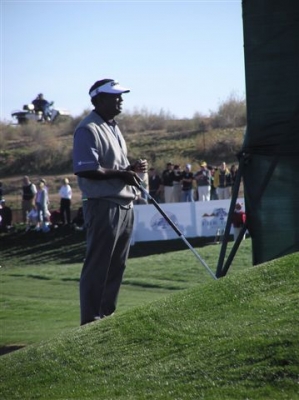 |
| Vijay Singh's consecutive Top 10 streak may have ended in San Diego, but there's no doubt his quest to catch Tiger Woods in '04 will continue. |
Corporate America has embraced us, and thatís an older demographic, established people with some money. So no, I donít see anything like that happening in golf.
GTMA: Corporate America does love golf, but the purses at these tournaments are getting pretty big, and TV ratings arenít necessarily increasing along with them. Do you see trouble on the horizon?
Strange: I see the issue from all different sides. The TV side isnít doing that great, so itíll be interesting to see how that works out in three years when it comes to renewing the contracts.
The networks are losing money because theyíre paying so much for the rights fees. And some of itís due to the economy.
The tournament sponsors are doing pretty well, but theyíre pretty much stretched to the maximum. Hopefully theyíll hang on.
Thereís a point of no return with every sport, and TV is losing money with every sport, not just golf. The rights fees have just gotten so big, it eventually had to happen. Itís got to stop somewhere Ė and Iím not just an older guy saying the guys get paid too much money Ė hell, you canít blame them for asking.
Look at hockey. They say the TV rights fees are going to go down 50%. When you eventually pay so much money for it, you just canít get anything back in return.
GTMA: Is that where you get the clamoring for Michelle Wie to come in and bring more interest into the events?
Strange: (Chuckles) Possibly, yes. Sponsors are looking to do anything Ė if they donít have Tiger Woods, theyíre looking for something to create interest.
GTMA: Wrapping it up, what are your thoughts on the í04 Ryder Cup?
Strange: My first thought is that I hope we behave up there in Detroit. Not we, the players, but we, the fans Ė as the English fans did over at the Belfry in í02.
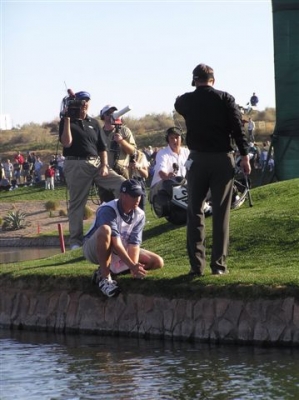 |
| Train wreck waiting to happen? Here, Phil Mickelson's dropping after putting one in the water -- but this time, it's because he hit the ball too far. |
As far as the play, itíll be close, as always. Itís going to be played on a wonderful golf course (Oakland Hills CC in Detroit). Itíll be exciting as it always is.
I hope the beer sales are in check and everybody treats the guests (the European team) as they should be treated, because we were treated royally over there at the Belfry. I hope we show them the same respect.
GTMA: Any players youíd like to see make the team?
Strange: Youíre going to have your core group of five or six guys, from Furyk to Tiger to Davis, PhilÖ But whatís fun is to see the young guys, playing for the first time. I loved seeing David Toms, Scott Verplank, Stewart Cink in there for the second time.
The excitement in those guysí eyes is a lot of fun. Theyíre excited about being there, and being a part of the team atmosphere the entire week. Itís one of those things you donít forget.
So Iíll look for whoís young like that Ė possibly a Jonathan Kaye.
GTMA: Hal Sutton will be busy with the whole issue, like you were.
Strange: Yeah, but heís got a lot of help, and itís all set in place for him. Being the Captain is a joy, not a chore. Heíll have fun with it.
Weíll all have fun watching the best players in golf competing against each other throughout the 2004 PGA Tour season. Thatís one of the things making professional golf unique Ė itís on every week, and there isnít a huge layoff between seasons.
Itís also fun to listen to folks like Curtis Strange and Johnny Miller, seasoned tour players talking us through the thought processes of the guys (and gals) hitting the shots.
Golf offers a different stage and script every week, with a different though familiar cast of characters, which virtually guarantees a set of unpredictable endings that many a Hollywood producer could only dream to create.
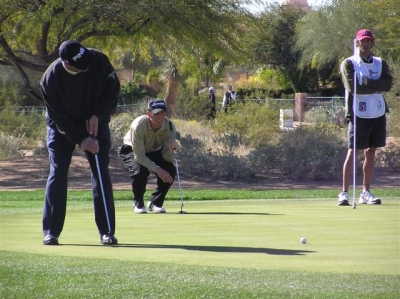 |
| Chris DiMarco uses the claw grip to putt as Jonathan Kaye looks on. These are definitely two to watch for this year's Ryder Cup team. |
Simply put, itís fun. And I know Iíll be watching.
Details:
Our thanks to Curtis Strange for agreeing to help us out with our 2004 PGA Tour preview!
| Related Links | Comments on this article? | |
|
Maryland National Golf Club Hollow Creek Golf Club Rocky Gap Resort PB Dye Golf Club in Ijamsville Whiskey Creek Golf Club |
E-mail Jeff Rendall, Editor: jrendall@golftheunitedstates.com |











